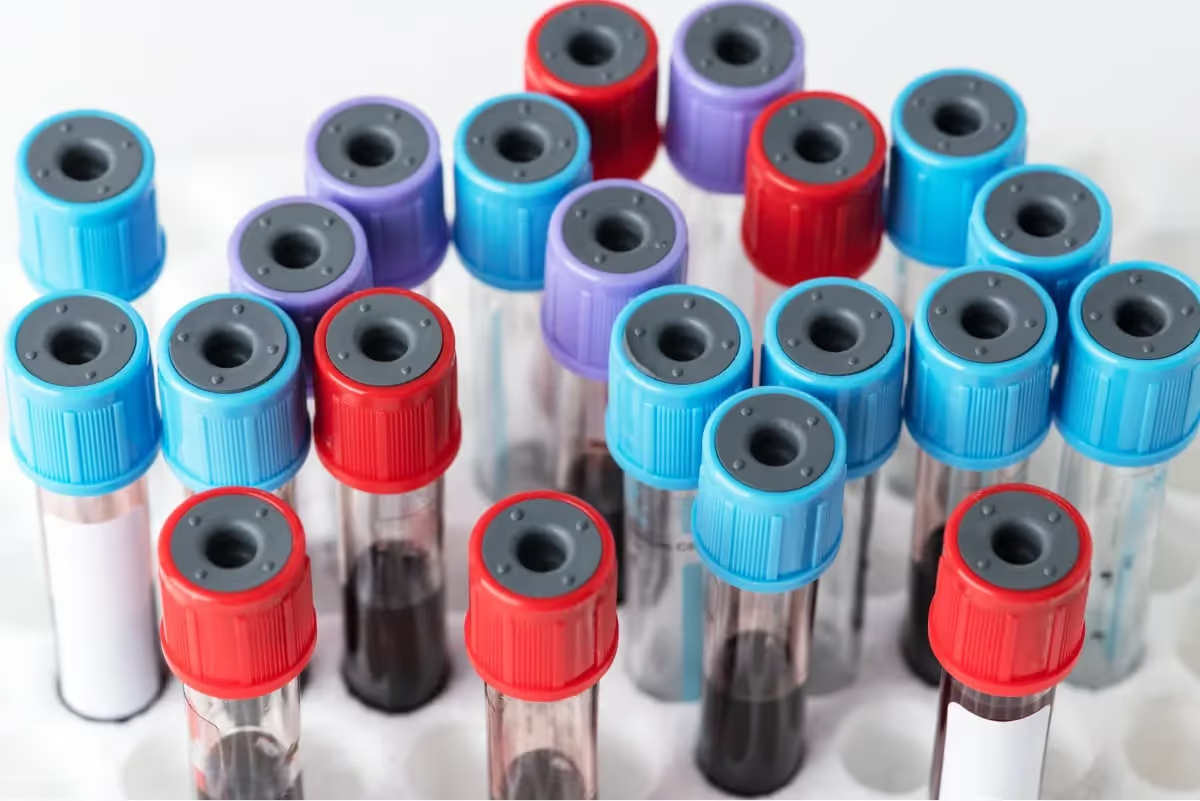The diagnostic journey for ALS invariably starts with a long battery of tests: EMGs, MRIs, breathing tests and often, many vials of blood. You might see these extensive blood tests, many of which have unusual names, and wonder what these have to do with ALS. We do not have a blood test that diagnoses ALS. The reason behind drawing these panels is to make sure we are not missing any other conditions that might mimic ALS. Most of these conditions do not directly involve the motor neuron, as ALS does, but rather cause trouble with the nerve fibers or with the connection between the nerve and muscle (something we call the neuromuscular junction). Early on in the disease process they might look very much like ALS. The initial diagnostic workup time can be understandably frightening but also confusing. Our aim is to take some of the confusion out of the mix by giving you an explanation of these various blood tests and the “why” behind it. At all points in your diagnostic journey, you are entitled to a full understanding of what we are doing, why we are doing it and the implications of the outcomes of those tests. Let’s dive in!
CBC: Complete blood count. This is a basic and routine blood draw that can give us an idea of your general health. It will look at things such as your white blood cells which are part of your immune system, your red blood cells which carry oxygen to all of the organs in the body and platelets which are involved in blood clotting.
CMP: Comprehensive metabolic panel. This is another very routine test giving us a sense of general health. It includes things like electrolytes, measures of kidney function as well as your liver function. In patients on riluzole, it is important to know how your liver is functioning before we begin the medication.
CK/Aldolase: these are markers of muscle breakdown. They can be very elevated in diseases of the muscle (also known as myopathies) but they can also be mildly elevated in ALS.
Heavy metal screen: heavy metal exposure may be associated with a higher risk of ALS. Some of the metals tested here include mercury (Hg), arsenic (As), lead (Pb), and cadmium (Cd).
SPEP/ serum immunofixation: SPEP stands for serum protein electrophoresis. In short, it is a test that looks for an abnormal protein (immunoglobulin) spike in the blood. There are some diseases of the nerve (also known as neuropathies) that may be caused by these abnormal proteins. If the SPEP is abnormal, other testing such as serum immunofixation or quantitative immunoglobulin testing may be necessary.
Cu: this is the elemental symbol for copper. Abnormalities in copper play a role in oxidative stress, which plays an important role in the development of ALS.
Ganglioside Antibody Panel: ganglioside antibodies are antibodies that are directed against certain components of the nerve. They are sometimes involved in the development of neuropathy. One such antibody known as GM1 is associated with a condition called multifocal motor neuropathy (MMN). In its early stages, MMN and lower motor neuron predominant ALS can appear very similar.
Acetylcholine receptors antibodies: these are antibodies that attack areas at the neuromuscular junction, the place where the nerve connects with the muscle and tells it what to do. Damage here can result in a condition called myasthenia gravis. Some forms of this disease look like ALS in its early stages.
MUSK antibodies: or muscle specific kinase antibodies also cause a form of myasthenia gravis.
Paraneoplastic panel: this panel looks for antibodies that are associated with certain types of cancers. In some cases, the antibodies produced can give a person a neurologic syndrome or disease and this may even be well before the cancer is diagnosed. Note, it is not the cancer itself that causes the neurologic issues here but rather the antibodies that the body mistakenly produces in response to the cancer.
HIV: motor neuron disease may be a rare manifestation of HIV infection.
HTLV: Human T- cell lymphotropic virus can cause a range of neurologic disorders, the most common being a disease that affects the spinal cord, also known as a myelopathy. This may look like upper motor neuron predominant ALS early on.
Lyme disease screening: Lyme disease can also affect different areas of the nervous system and although it is rare, can be an ALS mimic.
Vitamins B12: vitamin B12 deficiency can cause a disease of the spinal cord which manifests as both weakness and sensory symptoms. It may rarely look like ALS but there are often prominent features that set it apart. Treating vitamin B12 deficiency is important for overall neurological health and well being.
Thyroid function tests: you might see TSH, T4 and T3 on your report. These are part of a panel that looks at how well your thyroid is functioning. Thyroid issues may cause neurologic issues if untreated.
ANA and RF: anti-nuclear antibody and rheumatoid factor are 2 common tests that are in an autoimmune panel of blood work. We test for these when we are investigating autoimmune diseases like lupus or rheumatoid arthritis. It is common across many autoimmune disease states to have neurologic symptoms.
ESR and CRP: erythrocyte sedimentation rate and C reactive protein. These are non-specific markers of inflammation. When elevated, they do not tell us exactly what is going on but they do indicate that there may be some increased inflammation in the body. When elevated, there will often be other confirmatory tests that follow.
Vitamin D: although vitamin D deficiency has not been shown to definitively play a role in ALS progression or development, it is important to know your levels as it can impact your general well being and is very easy to supplement if deficient.
This is a non-exhaustive list but certainly some of the most frequent tests you will see on your reports. There may be additional testing that your physician will order based on your individual presentation and medical history. If you have any questions about your results, please never hesitate to reach out to your doctor! Some things may be flagged as abnormal and may not necessarily be worrisome. We want you to be well-informed and to take unnecessary concern out of the diagnostic process.












.png)


